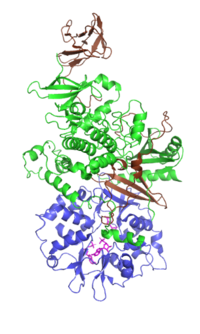
Photo from wikipedia
Metformin, a well‐known AMPK agonist, has been widely used as the first‐line drug for treating type 2 diabetes. There had been a significant concern regarding the use of metformin in… Click to show full abstract
Metformin, a well‐known AMPK agonist, has been widely used as the first‐line drug for treating type 2 diabetes. There had been a significant concern regarding the use of metformin in people with cardiovascular diseases (CVDs) due to its potential lactic acidosis side effect. Currently growing clinical and preclinical evidence indicates that metformin can lower the incidence of cardiovascular events in diabetic patients or even non‐diabetic patients beyond its hypoglycaemic effects. The underlying mechanisms of cardiovascular benefits of metformin largely involve the cellular energy sensor, AMPK, of which activation corrects endothelial dysfunction, reduces oxidative stress and improves inflammatory response. In this minireview, we summarized the clinical evidence of metformin benefits in several widely studied cardiovascular diseases, such as atherosclerosis, ischaemic/reperfusion injury and arrhythmia, both in patients with or without diabetes. Meanwhile, we highlighted the potential AMPK‐dependent mechanisms in in vitro and/or in vivo models.
Journal Title: Journal of Cellular and Molecular Medicine
Year Published: 2022
Link to full text (if available)
Share on Social Media: Sign Up to like & get
recommendations!